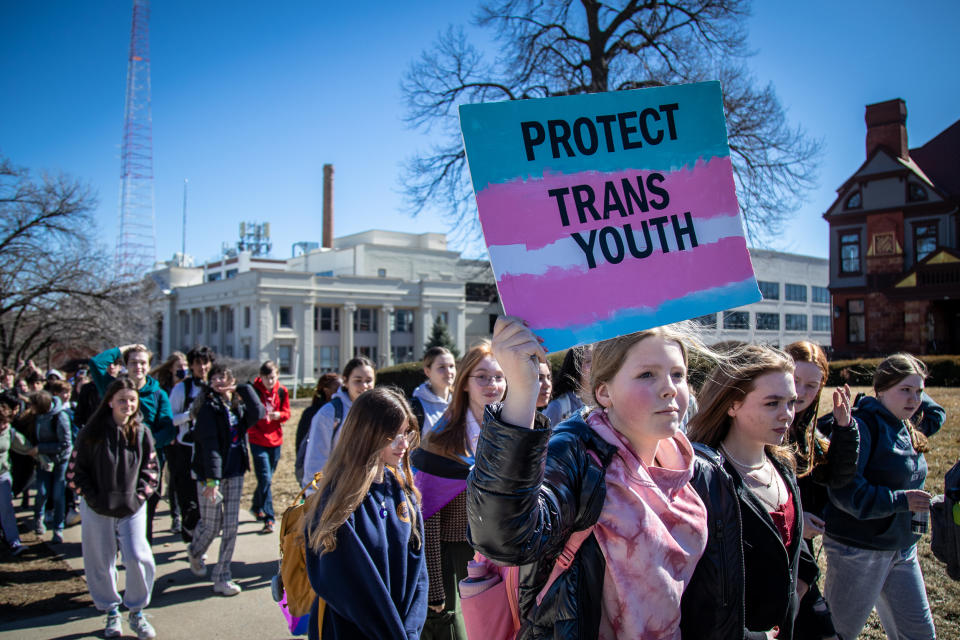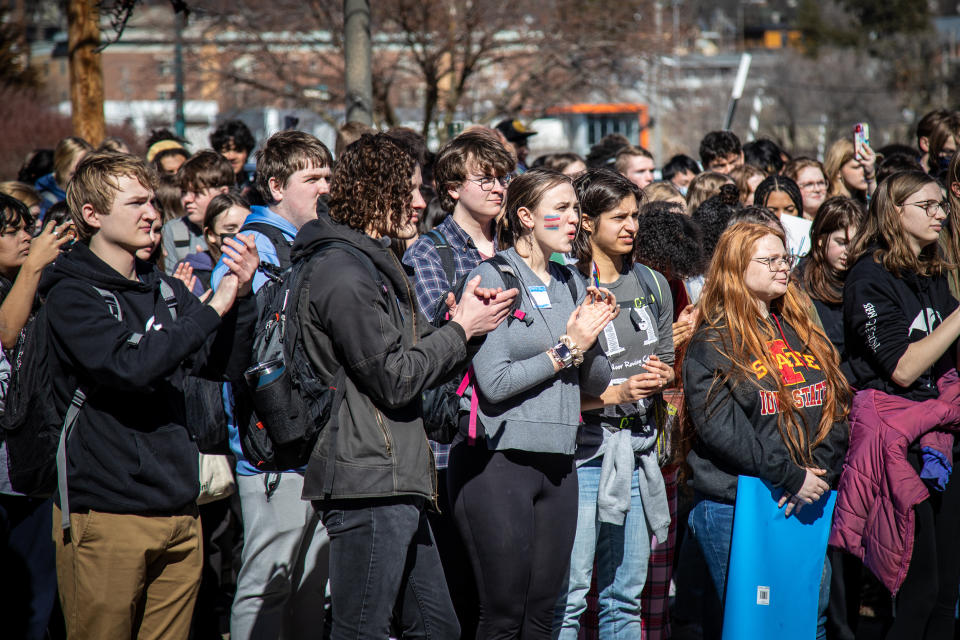Students across Iowa take part in walkouts to protest LGBTQ bills
Hundreds of Iowa students took part in a school walkout Wednesday to protest a slew of proposed state legislation that they say discriminates against LGBTQ students.
Students from 26 high schools and two colleges coordinated the walkouts to take place throughout the day across the state.
IowaWTF, a coalition of high school students that fights “discriminatory legislation,” and the Iowa Queer Student Alliance, a group for LGBTQ high school and college students, organized the day of protests.

Jemma Bullock, a member of the Iowa QSA, said the group is leading walkouts for two reasons: to educate students about the bills under consideration in the state Legislature and to get the attention of the lawmakers behind those bills.
“We are trying to make it so that it’s impossible for those in power to ignore us,” said Bullock, who is a senior at Ankeny High School, just north of Des Moines. “Because right now, there are people who are going to the Capitol and attending those public hearings about these bills — they have been teachers, psychiatrists, doctors, students, parents, administrators, all sorts of people who come and say, ‘This is harmful. This will have bad effects. This will cause bullying, it will cause depression and anxiety and it will not be safe for the LGBTQ+ community in our schools.’ And they just will not listen.”
By mid-afternoon Wednesday, students and local reporters started to share images and videos from the walkouts on social media.
Allison Steffen, a senior at Marion High School, north east of Cedar Rapids, and Hannah Neuville, a junior, said the walkout they organized at their school felt empowering. They said about 70 students and teachers joined them.
“We refuse to stay silent,” Neuville said. “This generation has the power to speak up and out about issues that affect us. The government shouldn’t have a say in private matters such as sexual orientation, gender identity — it doesn’t affect them. And they say that they’re doing it for protection. But who are they protecting?”
Steffen added, “We say gay, we say trans and that will not change.”
Some of the state’s largest school districts are among the 21 districts that have students participating, including Des Moines Public Schools, Iowa City Community School District and Ankeny Community School District. Students at Grinnell College and Iowa State University have also signed up to the walkout, according to Waverly Zhao, a senior at Johnston High School, just north west of Des Moines, and an IowaWTF co-founder.

A spokesperson for Grinnell College said in an email that the school strongly supports civic engagement by Grinnell students.
“We are watching this legislation closely and are deeply concerned about its potential impact on members of our campus community,” the statement said.
Phil Roeder, the spokesperson for Des Moines Public Schools, said he attended the walkout at Central Academy, a public secondary magnet school, along with more than 400 students.
"Students have the right to engage and speak out on issues that matter to them," Roeder said in an email. "With that right comes responsibilities — such as not disrupting the education of students who do not participate in an event such as a walkout — but Des Moines Public Schools respects and supports our students in sharing their voices and ideas on topics important to their lives."
Iowa lawmakers have proposed at least 29 bills targeting LGBTQ people so far this year, according to One Iowa Action, a local advocacy group.
Bullock said she is most worried about a group of bills that would ban instruction related to sexual orientation and gender identity, including one that bars instruction of gender identity through eighth grade. Bullock also mentioned another bill that would prohibit school staff from withholding a student’s gender identity from their parents if that gender identity differs from the student’s assigned sex at birth, and a joint resolution introduced Tuesday by eight House Republicans that would outlaw same-sex marriage.
Lawmakers have introduced bills seeking to restrict gender-affirming care for minors — which can include puberty blockers, hormone therapy and, rarely, surgery — in at least 23 states, including Iowa, so far this year. Utah, South Dakota and Mississippi have all enacted their bills, and Iowa advanced such a measure Tuesday, local NBC affiliate WHO-TV in Des Moines reported.
Zhao said the ban on transition-related care could hurt the mental health of trans minors, who already face a higher risk of suicidal ideation. She said she also fears that the bills targeting schools could impact the emotional support that LGBTQ students receive at school — and may not receive at home.
“The worry here is that increasing the parental involvement in such a controversial issue and such a personal issue for a lot of students will definitely cause harm to them,” she said.
So far this year, state lawmakers from across the country have introduced over 300 bills targeting LGBTQ people, according to counts by both the American Civil Liberties Union and a separate group of researchers who are tracking the flow of legislation.

